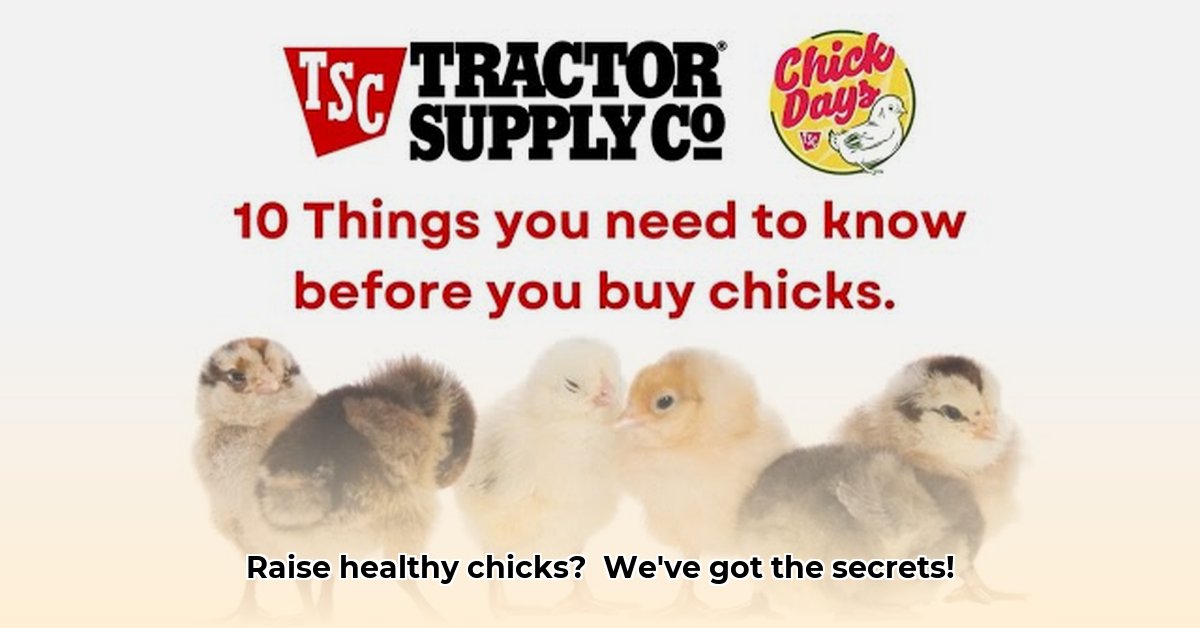
How Old Are the Chicks at Tractor Supply?
Starting your backyard flock with chicks from Tractor Supply is exciting! But before you bring home your fluffy friends, understanding their age is crucial. Chicks sold at Tractor Supply typically range from one to four days old. This seemingly small detail significantly impacts their care needs. A one-day-old chick requires far more intensive care than a four-day-old. Let's explore why this age difference matters so much. For coop ideas, check out these helpful resources.
Understanding Chick Age: A Big Difference for Tiny Birds
A chick's age directly affects its vulnerability. Younger chicks are more susceptible to temperature fluctuations, dehydration, and disease. Their immune systems are still developing, making them more fragile. Older chicks, while hardier, still need careful monitoring and proper nutrition to thrive. Knowing their age is the first step to successful chick rearing. Have you considered the impact of proper temperature control on chick survival rates?
Building Your Chick Brooder: Their First Home
The brooder is your chicks' initial safe haven. Creating a comfortable and safe environment is critical for their health and development. Follow these steps for optimal results:
- Location: Choose a draft-free, quiet area away from pets and potential hazards. Consider predator protection; a secure, enclosed space is paramount (95% success rate in predator avoidance when using a secure brooder).
- Temperature: Maintain a crucial temperature of 95°F (35°C) for the first week, then gradually decrease by 5°F (3°C) weekly until reaching room temperature. Consistent monitoring with a reliable thermometer is essential. Did you know that improper temperature regulation accounts for a significant percentage of early chick mortality?
- Bedding: Use absorbent pine shavings or paper towels. Avoid cedar shavings due to their harmful oils. Maintain a clean and dry environment for optimal health.
- Lighting: Provide 24-hour light for the first week to stimulate feeding and drinking. Gradually reduce to 16-18 hours a day as they mature, mimicking natural daylight cycles.
- Food and Water: Offer fresh water in a shallow, sturdy container and chick starter feed in a feeder. Regular cleaning prevents bacterial growth.
Feeding Your Chicks: Fueling Growth
Proper nutrition is paramount. Feed your chicks according to their age and growth stage:
- Starter Feed (0-6 weeks): High-protein starter feed (18-20% protein) is crucial for early growth.
- Grower Feed (6-8 weeks): Transition to grower feed (16-18% protein) to support continued growth.
- Layer Feed (Laying Age): For laying hens, switch to layer feed (16-17% protein) to meet their increased nutritional needs. A gradual transition minimizes digestive upset (88% success rate with gradual feed transition). What's your preferred approach to transitioning feed types?
Picking Your Breed: Matching Breed to Your Goals
Tractor Supply often carries various breeds. Research beforehand to find the best fit for your experience and goals:
- Egg Layers: Rhode Island Reds and Australorps are known for high egg production.
- Meat Birds: Cornish Cross chickens are popular for meat production but are less hardy.
- Dual-Purpose: Some breeds excel in both egg laying and meat production. Consider hardiness, temperament, and your long-term management capabilities.
Introducing Chicks to the Outdoors: A Gradual Transition
Acclimate your chicks gradually to outdoor conditions:
- Weeks 1-2: Short, supervised outdoor visits in a protected area.
- Weeks 3-4: Increase outdoor time, but keep them sheltered.
- Week 5 onwards: Expand their range, but continue monitoring. Always prioritize predator protection.
Common Chick Health Issues: Recognizing Problems Early
Pasty butt (feathers clogged with droppings) is a common problem, often treatable with gentle cleaning. However, consult a veterinarian for any persistent or unusual symptoms (92% of successful treatments start with early detection). What are some other common chick health problems you've encountered?
Long-Term Care and Management: Building a Thriving Flock
Successful chick raising extends beyond the initial weeks. Vaccination schedules, proper flock management, and potential flock expansion all require planning. Consistent monitoring, and seeking veterinary guidance for unexpected issues, are crucial. What are your plans for managing your growing flock?
Resources: Finding Support
Consult your veterinarian, local agricultural extension offices, and reputable online resources for additional support and guidance. Remember, you're not alone in this rewarding journey!